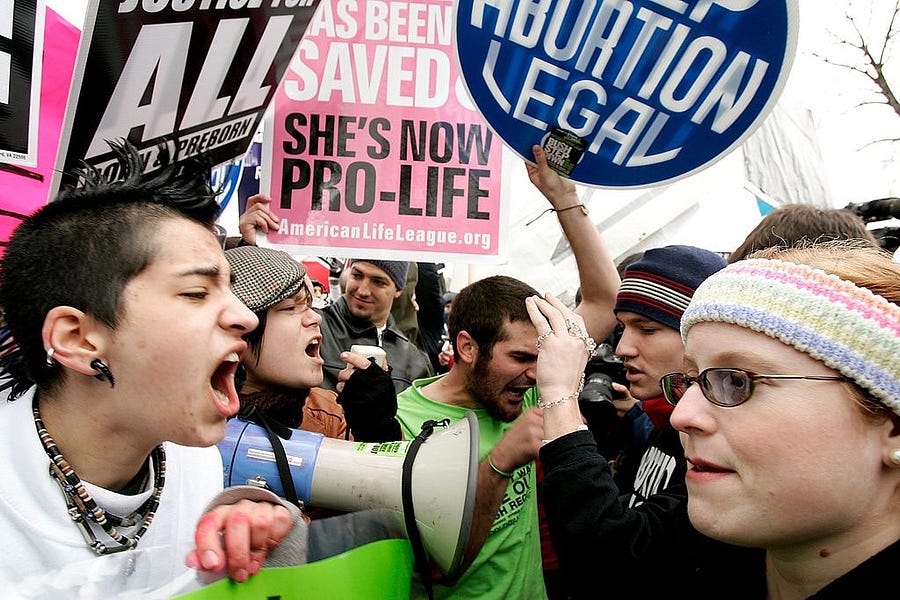The state of Mississippi has thrown down the gauntlet. On July 21, it filed its brief in Dobbs v. Jackson Women’s Health Organization, and it unequivocally asked the Supreme Court to overrule Roe v. Wade and Planned Parenthood v. Casey and to remove extraordinary protections for abortion from American constitutional law. Mississippi’s argument as to why Roe should fall is easily summed up in a single sentence: “Because nothing in constitutional text, structure, history, or tradition supports a right to abortion.”
I’m going to put my cards on the table right up front. I agree with Mississippi. Roe v. Wade is bad constitutional law, and it should be overruled. Even a jurist as thoroughly pro-choice as Ruth Bader Ginsburg said in 1992 that Roe was “breathtaking” in scope and wondered if more “measured motions” would have been appropriate.
But this newsletter isn’t going to focus on the constitutional arguments against Roe. Instead, I’m going to focus on the human factor. If you listen to my podcast with my brilliant co-host Sarah Isgur, you’ll note that we constantly return to the same mantra, “Judges are human beings.” They’re not philosophical robots. They live in a world, and they’re shaped by that world—albeit some more than others.
Thus, I’ve written at length how a number of justices seem intent on reaching consensus when they can, favoring narrow opinions over broad opinions to reach supermajority decisions even in the most hot-button culture war cases. See, for example, the 7-2 decision for a Christian baker who refused to bake a custom cake for a same-sex wedding celebration, or the recent 9-0 decision for Catholic Social Services in Fulton v. Philadelphia.
In reading these cases, it seems that multiple justices want to calm the American culture war. They do not want SCOTUS to be perceived as a partisan instrument of one American tribe. Regardless of their other philosophical leanings, they are also institutionalists. They want to preserve the court’s good name, and there is no faster way to politicize the court than with sweeping rulings that upend American politics.
There’s a strong prudential argument that this institutionalism has merit. And there’s ample support for the idea that broad, sweeping precedent can destabilize American politics. One of those precedents is Roe v. Wade itself.
In fact, the destabilizing effect of Roe was one of Ginsburg’s chief complaints about the decision. In the 1992 law review article I linked above, she notes that the Texas law at issue in Roe was one of the most strict in the nation, and she wonders what would have happened if the court’s ruling had been more limited:
Suppose the Court had stopped there, rightly declaring unconstitutional the most extreme brand of law in the nation and had not gone on … to fashion a regime blanketing the subject, a set of rules that displaced virtually every state law then in force. Would there have been the 20-year controversy we have witnessed?
The answer is no. If democracy had been permitted to run its course, American law and American political culture would look quite different. Yes, abortion would still be contentious, but taking a vital moral question out of the hands of the American public created an open wound on the American body politic.
That’s a short way of saying that it would be a profound mistake to assume that overruling Roe is the most politically and culturally disruptive path forward. In fact, there’s a strong argument that overruling Roe could—after a period of shock and rage in progressive America—actually help depolarize America.
By returning the abortion question to states, overturning Roe could de-escalate national politics, de-escalate the judicial nomination wars, and perhaps cause voters to focus more on political races closer to home. It’s not as if the case presents the court with a choice between stability and instability. The instability is already here, and it’s been building for almost 50 years.
I understand quite well the contrary argument. I completely get the idea that overruling Roe—especially when national polarization is already near the red line—could trigger so much fury that it creates a serious political crisis. Heck, in my book I wrote of a scenario where rage at a Roe reversal created irresistible momentum for court-packing, and state resistance to the packed court fractured the nation.
Moreover, as Sarah pointed out in our most recent podcast, abortion doesn’t represent the sole (or even principle) source of partisan divisions in the United States. Negative partisanship is so high that American politics are often dominated by pure hate. We’ll turn virtually any issue into a culture war.
But there is simply no path forward that is free of partisan rage. Overrule Roe, and the left’s rage will be volcanic. Uphold Roe, and the right’s fury at its own judges may be so complete that it turns its back on the classical liberal legal project entirely.
Conservative legal minds have spent decades building a formidable legal movement dedicated to restoring jurisprudence to an originalist/textualist framework, but if that legal movement doesn’t reverse perhaps the least originalist/textualist case of modern times, there will be those who will seek to tear down the entire infrastructure. And when they tear it down, what kind of judges will take their place?
Finally, let’s not forget the American majority. One of the consequences of Roe is that America is now an abortion outlier, one of the more permissive countries in the world and far more permissive than most Americans want (most Americans reject both second and third-trimester abortions, for example). Will this majority consider reversing Roe a constitutional crisis if it means that they get the abortion laws they want? Does it undermine the court’s credibility to tell the nation that an issue the Constitution doesn’t address is one best left to the ballot box?
One of the dangers of institutionalism is that it leaves the law behind and turns justices into pundits. There are prudential reasons for, say, an originalist justice to choose narrow originalist rulings over broader originalist rulings. Sweeping decisions can have unanticipated consequences. But the moment Roe hit the books, the court left stability behind, and our nation has suffered for it ever since.
The best form of institutionalism preserves the integrity of the court by preserving the integrity of its reasoning. Roe was and is bad law. It constitutionalized profound injustice and inflamed national passions. Preserving the status quo keeps the nation on the path of polarization while also preserving bad law. Reversing Roe will not only replace bad law with better law, it could—over time, as voters impose their will—ease an American culture war that threatens to tear this country apart.
One more thing …
In last Sunday’s (very controversial!) newsletter, I made the point that NIMBYism—short for “not in my backyard”—helped freeze into place unjust structures long after the racist policies that created those structures ceased to exist. For example, restrictive zoning rules can keep poor families from moving to better neighborhoods. Protective parents can prevent school districts from expanding to include lower-income families.
In response, a Dispatch member recommended that I listen to this podcast, with Ezra Klein. He interviewed Vox’s Jerusalem Demsas, and the subject was why blue cities are so “outrageously unaffordable.” The subtitle could be (to call back to a famous book in Christian circles) “how helping hurts.”
Klein is very effective at pointing out how local policies—even local policies designed to increase public participation—are often exploited by those with the most resources (including money and time) to preserve their own power. This excerpt is particularly interesting. First, here’s Demsas:
I think that there’s this broader correct diagnosis that progressives have done, that there is massive regulatory capture by billionaires, by big business, by oil companies, to stop environmental legislation from passing. But there’s very little reckoning of the fact that there are large swaths of the community that makes up progressives that have also engaged in regulatory capture. And that things like homeownership, and things like blocking housing, and transit, and infrastructure in their communities is something that’s not being done by developers or some kind of nefarious other force.
It’s being done by people who make up this coalition. And I think that that kind of cognitive dissonance is something that is not really reckoned with. And I mean, you mentioned this kind of idea of participatory democracy does not actually solve this problem. And I think it’s just structural. You have structural issues with the fact that people who are willing to engage in these kinds of local politics are systematically older, systematically whiter, and systematically they’re more likely to be homeowners and have a preference towards stability rather than growth and change.
And we have specific data for this. Katherine Einstein and her co-authors at Boston University looked at in-person meetings pre-COVID to see who attended. And before COVID, you had 75 percent of people [who] were over 50, whereas the surrounding population was actually only 52 percent over 50. And 73.4 percent were homeowners, while the general population in the area was only 45.6 percent homeowners.
And here’s Klein, a bit later:
There are a lot of processes at basically every level of government that are designed with the idea of a population that wants to participate. But then, when that population doesn’t participate, to paraphrase Cain here, it leaves a void that organized interests flow into. And so, it is then the people who are most organized, who have the money, who can hire lobbyists, who can sign up for everything, and generate the information, who are well organized, who have something on the line, who show up.
That’s not always bad. I mean, sometimes that is a community that has a real need for something. But it is often bad, because as the data you’re pointing to suggests, usually those are folks who just own more. And as for the people who are not already in the community, have not benefited yet from the project, that has not yet been built—of course you can’t organize the future recipients of something that has not yet happened. That’s a very tough organizing job.
I apologize for the long block quotes. But I’m hoping to whet your appetite to listen to the entire thing. It’s encouraging to see progressives and conservatives asking tough questions about whether even the most well-meaning policies sometimes preserve the same historic structures they’re designed to disrupt.
One last thing …
If this doesn’t inspire you, then I don’t know what to say:







Please note that we at The Dispatch hold ourselves, our work, and our commenters to a higher standard than other places on the internet. We welcome comments that foster genuine debate or discussion—including comments critical of us or our work—but responses that include ad hominem attacks on fellow Dispatch members or are intended to stoke fear and anger may be moderated.
You are currently using a limited time guest pass and do not have access to commenting. Consider subscribing to join the conversation.
With your membership, you only have the ability to comment on The Morning Dispatch articles. Consider upgrading to join the conversation everywhere.